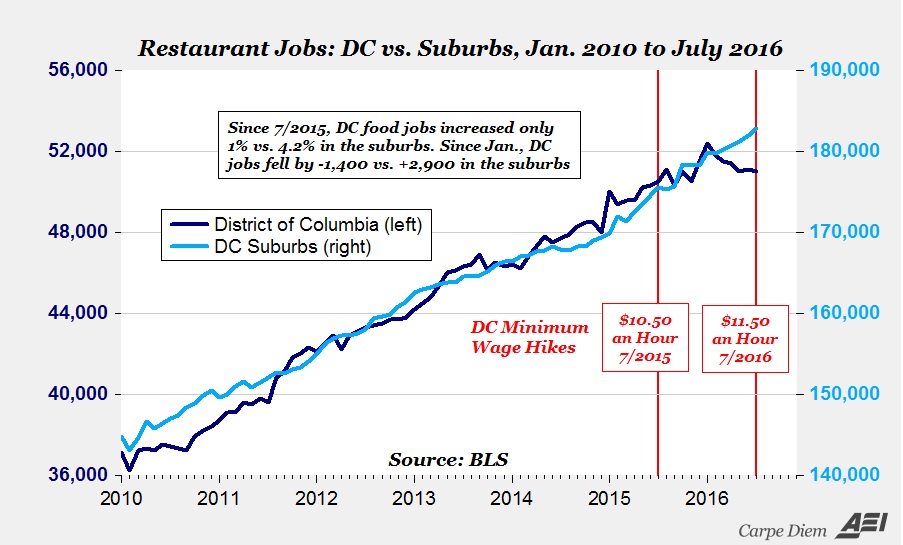Fight For $15 Meets Reality: D.C. Restaurants Lost 1,400 Jobs During First Half of 2016
In a shocking twist, D.C. is not exempt to the basic laws of economics.
Washington, D.C., is getting a real life lesson in economics as the city moves closer to implementing a $15 per hour minimum wage.
During the first six months of 2016, restaurants in D.C. shed 1,400 jobs. That's a 2.7 percent decline in food service jobs in just six months, the largest drop seen in that sector in more than 15 years. Even during the 2008 recession, restaurant jobs barely dipped before continuing a steady, decades-long rise in Washington.
Mark Perry, an economist and scholar for the American Enterprise Institute, says restaurant jobs are often "ground zero" for consequences of minimum wage increases. The minimum wage in D.C. increased to $10.50 an hour in July 2015 and climbed to $11.50 an hour on July 1, 2016, with further increases planned in coming years until the goal of $15 per hour is achieved
It's telling that the decline in restaurant jobs appears to have struck only within the borders of the capital city, while restaurants in the Maryland and Virginia suburbs added 2,900 jobs during the first six months of this year.
"While it might take several more years to assess the full impact, the preliminiery evidence so far suggests that D.C.'s minimum wage law is having a negative effect on staffing levels at the city's restaurants," Perry wrote on his blog this week.
For the visual learners in the audience, here's how food industry job growth in Washington, D.C., compares to the city's nearby suburbs over the past decade:

This shouldn't come as much of a surprise to anyone with a rudimentary understanding of economics. Making it more expensive to employ people will cause businesses to employ fewer people, particularly in industries like food service where margins are already tight.
Supporters of higher minimum wages will claim there is little actual evidence of job losses when one state raises mandatory wages and nearby states do not. Almost always they will point to a single study looking at Pennsylvania and New Jersey that found no negative economic consequences for workers after the latter state increased the minimum wage by a few cents in 1992.
That study has been debunked, but even if you buy the premise that small adjustments in minimum wages might not have catastrophic affects, there's another problem: progressive policymakers are no longer pushing for small increases in the minimum wage.
As a result, we're getting a real life economics experiment on a grand scale. In addition to Washington, D.C., local officials in Seattle, Los Angeles and New York have approved laws mandating $15 per hour. Whole states are following suit, with measures already passed in California, New York and Oregon.
It's no secret what will happen after these laws take effect.
"Economically, minimum wages may not make sense," admitted California Gov. Jerry Brown just moments before putting his name on a bill that could cause disastrous economic consequences for the already-impoverished rural parts of his state.
Cities are more likely to be able to absorb higher wage mandates, but the restaurant data from D.C. shows that even robust job markets are not exempt from taking a hit.
"Despite what we hear from unions, the Fight For 15 crowd and other minimum wage advocates, the evidence from D.C.'s restaurant industry—an industry often considered as 'ground zero' for minimum wage effects—demonstrates that demand curves for low-skilled workers actually do slope downward," Perry says, referring to the basic law of economics that says demand for a product or service will decrease as the cost increases.
In other words, making it more expensive to employ someone—as high minimum wages do—will cause fewer people to be employed. It's really that simple.


Show Comments (141)